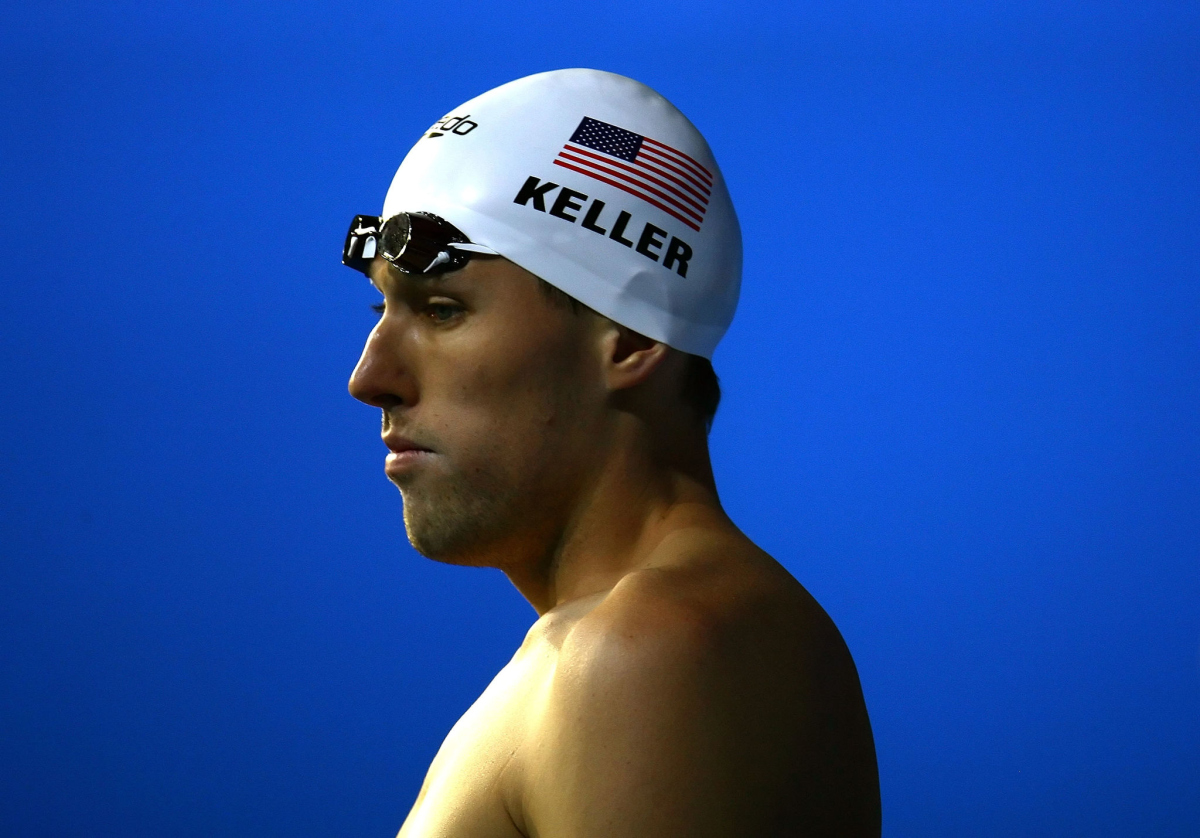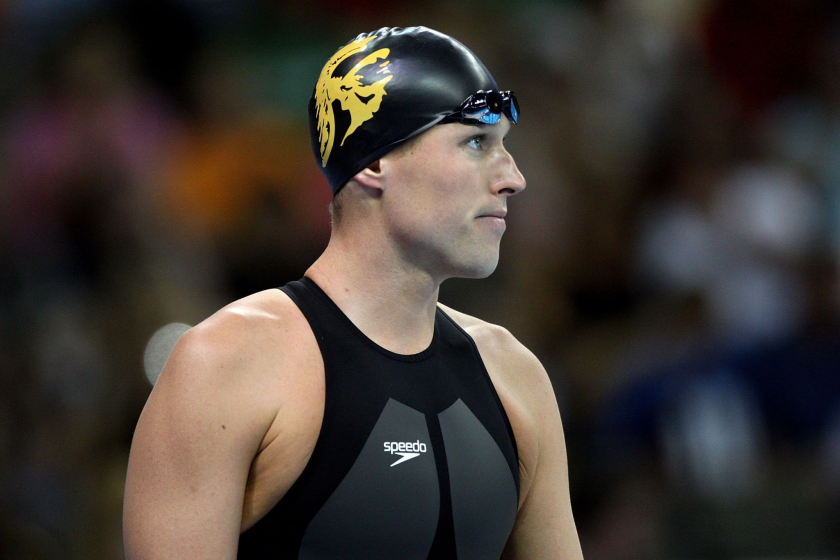Olympic medalist and USC swimmer Klete Keller pleads guilty to Capitol riot charge

- Share via
Klete Keller, the five-time Olympic swimming medalist from USC, agreed to a plea bargain Wednesday after facing seven federal charges for participating in the U.S. Capitol riot.
During a hearing in U.S. District Court in Washington, Keller pleaded guilty to a felony count of obstruction of an official proceeding and will cooperate with prosecutors.
Keller, 39, stood out amid the chaos in the Capitol rotunda on Jan. 6, thanks to his 6-foot-6 height, beard and distinctive U.S. Olympic team jacket with “USA” written in large letters on the back.
In a statement of offense signed earlier this month, Keller admitted to “trying to obstruct, influence, and impede” Congress certifying the electoral college votes and, afterward, discarding the Team USA jacket.
“I destroyed the phone and memory card that contained the photographs and videos I recorded from inside the Capitol building, and I threw away my red, white, and blue ‘USA’ jacket,” Keller wrote.
Though the felony carries a maximum sentence of 20 years in prison, federal sentencing guidelines for an offense charged at this level call for 21 to 27 months in prison. No date for sentencing has been set, but Judge Richard J. Leon scheduled a status conference for Dec. 16.
The non-incarceration consequences of pleading guilty to a felony include losing the rights to vote and own firearms.
Olympic medalist and USC swimmer Klete Keller’s signed plea agreement.
Edward B. MacMahon Jr., Keller’s attorney, didn’t respond to a request for comment. A spokesman for the U.S. attorney’s office in Washington declined comment.
During the assault on the Capitol, Townhall Media senior writer Julio Rosas had captured Keller on a video posted to Twitter. The first public link between Keller and the riot came in a story published Jan. 11 by SwimSwam, a popular outlet for swimming coverage. FBI agents surveilled Keller’s home in Colorado Springs the same day, according to a search warrant affidavit unsealed in response to a request by The Times, and he was charged Jan. 13. The video played a key part.
“At approximately fourteen minutes and thirty-eight seconds, [Keller] is still in the Rotunda, and the back of his jacket is again visible,” the complaint by FBI Special Agent Matthew R. Barofsky said. “[Keller] stands taller than a number of individuals around him and can clearly be seen as law enforcement officers repeatedly attempt to remove him and others from the Rotunda.”
Keller acknowledged being inside the Capitol for about 50 minutes on Jan. 6, including shouting profanity and “shaking law enforcement officers off me” in the rotunda.
A day after being charged, Keller turned himself in to authorities in Denver. FBI agents searched his home that afternoon. They seized a black drawstring bag, according to the search warrant return, but nothing else.
“Agents have been informed by at least one person that KELLER may have left his cell phone and jacket in D.C., but your affiant has not been able to confirm that,” FBI Special Agent Brandon Kimble wrote in the search warrant affidavit.
Former USC swimmer Klete Keller, who won five Olympic medals for the U.S., has been charged in connection with participation in the Capitol riot.
Keller deleted his social media accounts, which associates said had featured a growing number of messages during the previous year supporting then-President Trump, and resigned from the Colorado Springs commercial real estate firm Hoff & Leigh, where he worked as an independent contractor.
In a statement at the time, USA swimming said Keller’s “actions in no way represent the values or mission” of the sport’s governing body in the U.S. and noted he hadn’t competed since 2008.
A federal grand jury indicted Keller on seven counts in February, including disorderly conduct in a restricted building, civil disorder and obstruction of an official proceeding. More than 600 people have been charged in connection with the riot.
Keller, who has been free on a personal recognizance bond, hasn’t made any public statements since the riot beyond brief greetings or responses during court appearances conducted through video conferencing.
“He tells everybody that he’s very sorry and he wants to turn it around,” Jon Urbanchek, who coached Keller for several years and remains close to him, told The Times earlier this year.
Keller’s biography was scrubbed from Hoff & Leigh’s website, but Colorado real estate records show he resumed working for the firm in May.
Federal agents searched the home of Klete Keller, the Olympic medalist swimmer from USC charged in the Capitol riot, in Colorado Springs on Jan. 14.
Keller won two medals at the Sydney Olympics in 2000 at age 18, then captured three individual NCAA titles for USC in 2001 and 2002. He delivered a signature moment at the Athens Olympics in 2004, holding off Australian star Ian Thorpe in the anchor leg of the 800-meter freestyle relay to win gold along with teammates Michael Phelps, Ryan Lochte and Peter Vanderkaay. Keller added another gold in the same event at the Beijing Olympics four years later.
Though Keller graduated from USC in 2009 with a degree in public policy and real estate development, life after swimming wasn’t easy. He struggled to hold jobs, and experienced a contentious divorce that was finalized in 2015 along with a child custody fight that’s ongoing. At one point before moving to Colorado in late 2017 in search of a fresh start, he said, he lived in his car for several months.
“I found the real world pressure much more intimidating and much more difficult to deal with because I went from swimming to having three kids and a wife within a year,” Keller said in a 2018 interview with the Olympic Channel podcast. “I felt when I failed a much more acute sense of pain and frustration and failure than I did with swimming. … All those years of success I had with swimming really gave me inaccurate expectations of the world, so it was much harder to cope with the little mini-failures I would experience on any given day.”
Olympic medalist and USC swimmer Klete Keller’s signed statement of offense.
More to Read
Go beyond the scoreboard
Get the latest on L.A.'s teams in the daily Sports Report newsletter.
You may occasionally receive promotional content from the Los Angeles Times.












